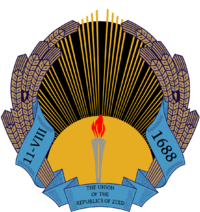Presidency Council of Zeed
| Commonwealth of Zeed | |
| Collective Head of State | |
 Seal of the Commonwealth of Zeed | |
| Overview | |
|---|---|
| Members | |
| Responsibilities | |
| Veto Power | Limited, subject to National Assembly override |
| Appointments | Prime Minister, Council of Ministers (upon recommendation), Presiding Judge, and Federal Supreme Court members |
| Military Authority |
Ceremonial Commander-in-Chief; no command authority |
| Established under Article 36 of the Constitution of the Commonwealth of Zeed | |
The Presidency Council of Zeed is the collective head of state of the Commonwealth of Zeed, established under Article 36 of the Constitution of the Commonwealth of Zeed in 1727 AN. Consisting of a President of the State and two Deputy Presidents elected by a two-thirds majority of the National Assembly of Zeed on a single electoral list, the Council serves as the highest representative body of state sovereignty and exercises significant constitutional powers, including the nomination of the Prime Minister, approval of the Council of Ministers, limited legislative veto authority, and ceremonial command of the Armed Forces of Zeed.
The Council operates on the principle of unanimous decision-making, with members prohibited from delegating their responsibilities to proxies, ensuring collective responsibility in matters of state importance. Its members must meet stringent eligibility criteria, including a minimum age of forty years, demonstrated integrity and good reputation, and restrictions on past associations with prohibited political parties. The National Assembly maintains oversight through its power to remove Council members for incompetence or lack of integrity by a three-fourths majority vote, while also being responsible for filling any vacancies that arise through resignation, removal, or death of Council members through the same supermajority requirement.
Formation and Structure
The Presidency Council was established under Article 36 of the Constitution of the Commonwealth of Zeed. Its members are elected by the National Assembly of Zeed with a two-thirds majority based on a single electoral list. This constitutional article allows the National Assembly to remove members of the Presidency Council for incompetence or lack of integrity by a three-fourths majority vote.
In the event of resignation, removal, or death of a Council member, the National Assembly fills the vacancy through a three-fourths majority vote. Members of the Presidency Council must meet eligibility requirements similar to those for the National Assembly, with additional criteria: they must be at least forty years old, maintain a good reputation, and demonstrate integrity. Former members of prohibited political parties are subject to a ten-year exclusion period, disqualifying them from serving on the Presidency Council.
Powers and Responsibilities
Under Article 37 of the Constitution, the Presidency Council has a limited veto authority over legislation passed by the National Assembly. This veto must be exercised within fifteen days of notification. If the National Assembly overrides the veto with a two-thirds majority within thirty days, the decision becomes final.
The Presidency Council also holds the authority to nominate the Prime Minister unanimously, who, in turn, recommends members of the Council of Ministers for approval by the Presidency Council. Furthermore, the Presidency Council appoints the Presiding Judge and members of the Federal Supreme Court upon recommendations from the Higher Juridical Council.
While the Presidency Council serves as the ceremonial Commander-in-Chief of the Armed Forces of Zeed (Article 39 of the Constitution), it holds no direct command authority. Operational military command flows from the Prime Minister to the Minister of Defense and the military chain of command. The Council, however, maintains the right to receive briefings, inquire about military matters, and provide advice. Deployment of the Armed Forces outside the country requires the Council’s consent and the consent of the Committee of Euran Salvation.
Committee of Euran Salvation
The relationship between the Presidency Council and the Committee of Euran Salvation represents one of the most significant vestiges of the Raspur Pact occupation (1701 AN-1727 AN). Despite the formal independence restored under the Constitution of the Commonwealth of Zeed, the Committee maintains considerable influence over the Council's decision-making process, particularly in matters of defense, security, and foreign affairs. This arrangement evolved from the structures established during the occupation period when the Allied Control Commission exercised direct oversight over Zeedic governance.
The Committee's influence is most visible in military and security matters, where the Presidency Council must secure the Committee's approval for any deployment of the Armed Forces of Zeed beyond national borders. Additionally, while not formally codified in the Constitution, established practice requires the Council to consult with the Committee on major appointments to military and security positions, as well as significant foreign policy initiatives. This consultative relationship is facilitated through the office of the High Representative of Trans-Euran Command who serves as the primary liaison between the Presidency Council and the Committee of Euran Salvation.
This institutional relationship has been characterized by some scholars as a form of "supervised sovereignty," where the Presidency Council maintains formal constitutional authority while operating within parameters acceptable to the wider Raspur Pact security framework. However, proponents argue that this arrangement has provided Zeed with stability and integration into regional security structures following the turmoil of the Third Euran War.
Current Officeholders
| Position | Office Holder | Party | Assumed Office |
|---|
Former Office Holders
| Position | Office Holder | Party | Tenure |
|---|---|---|---|
| President of the State | Gennady Lakshmann | All-Union Humanist Party | 1728 AN–1749 AN |
| Deputy President of the State | Vivek Jarkhanda | All-Union Humanist Party | 1730 AN–1749 AN |
| Deputy President of the State | Jerahmeel Yeter | All-Union Humanist Party | 1736 AN–13.XIV.1742 |
| Deputy President of the State | Aleksandr Chernavyin | All-Union Humanist Party | 1745 AN–1749 AN |